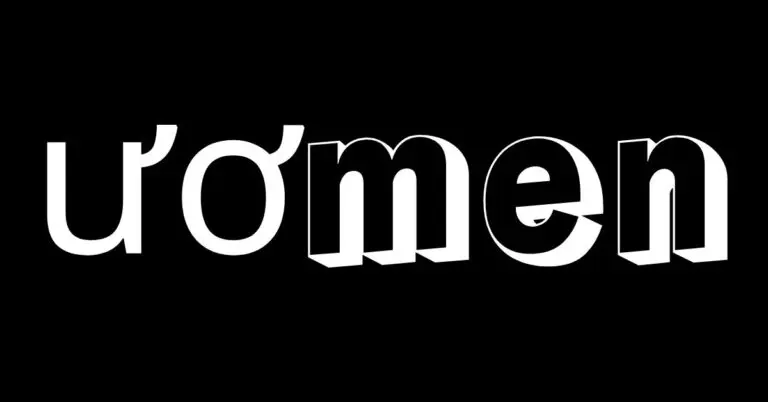
One such term is “Ươmen.” Though this word may not be widely known outside specific regions, it has a rich and complex background that has captivated those who seek to understand its full depth. But what exactly is Ươmen? How did it originate, and what significance does it hold today? Let’s dive in to answer these questions and more. The world is full of intriguing cultural concepts and terms that aren’t easily translated into other languages, often because they carry deep meanings rooted in history, society, and individual experience.
The Origins of Ươmen

Ươmen is a term that stems from ancient traditions, drawing from a specific cultural background that reflects deep philosophical and societal principles. Though the word may not have a direct English equivalent, it is thought to embody ideas related to personal growth, societal balance, and the natural order of life.
Some historical scholars suggest that Ươmen originated from a blend of mythological and spiritual practices that were prevalent in Eastern cultures. It was a word used to describe the interconnectedness of the universe, the harmony between man and nature, and the pursuit of inner peace. Others trace its roots to more practical applications in community governance, where Ươmen was viewed as a guiding principle for ethical behavior and leadership.
In either case, Ươmen is not just a word but a concept that has played a role in shaping cultural narratives and philosophies. Its origins may be shrouded in mystery, but its impact remains significant to this day.
Cultural Significance of Ươmen
Ươmen carries immense cultural importance in the societies where it originated. The term often symbolizes a way of living in harmony with the world around you. It could be seen as an aspiration to achieve balance in both personal and community life.
In some cultures, Ươmen is a marker of respect for the environment, a reminder that humans are merely one part of a much larger ecosystem. This principle has found its way into modern sustainability practices, where echoes of Ươmen can be seen in environmental conservation efforts and eco-friendly movements around the world.
From another perspective, Ươmen is also tied to personal morality and ethics. In this sense, it is not merely about existing in the world but about existing in the right way — by practicing empathy, kindness, and integrity in your daily actions.
Moreover, Ươmen often intertwines with spiritual practices, helping individuals to meditate on their place in the universe and their responsibilities to themselves and others. It may be invoked during rituals or as part of daily prayers, reflecting its deeply embedded role in the cultural fabric.
How Ươmen Is Practiced Today
Though its roots lie in ancient traditions, Ươmen continues to influence modern life. However, its application may differ across regions and communities. For some, Ươmen is seen as a personal journey — a lifelong pursuit of balance, peace, and self-improvement. It serves as a philosophical guide, helping individuals to navigate the complexities of modern society while remaining grounded in traditional values.
In the business world, Ươmen is sometimes invoked as a framework for ethical leadership and corporate responsibility. Leaders who embrace Ươmen prioritize fairness, transparency, and the well-being of their employees and stakeholders. They are seen not just as managers but as custodians of a broader moral and social order.
Environmentalists and sustainability advocates also find inspiration in Ươmen. The principle that humans must coexist with nature, rather than exploit it, is central to many contemporary environmental movements. Whether through the promotion of renewable energy, conservation efforts, or sustainable farming practices, the ethos of Ươmen continues to resonate today.
In the personal sphere, individuals may practice Ươmen through mindful living, focusing on mental health, emotional well-being, and social harmony. It’s about striving for a balanced life, one that nurtures the self while contributing positively to the community.
Also read Skşi: Exploring the Multifaceted World of an Ancient Tradition
Ươmen and Its Connection to Modern Philosophy
In the Western world, Ươmen may not be as widely recognized as concepts like mindfulness or karma, but it shares many similarities with these practices. At its core, Ươmen speaks to the universal human desire for purpose and meaning. It suggests that by living in harmony with the world, we can achieve a sense of peace and fulfillment that transcends the material.
This aligns closely with contemporary discussions in philosophy and psychology. For example, the concept of “flow” in positive psychology, where individuals become fully immersed in a task or experience, can be seen as a manifestation of Ươmen. When in flow, a person is not only productive but deeply connected to the present moment — much like the state of harmony that Ươmen advocates for.
Similarly, modern philosophers who explore the ideas of existentialism or humanism may find echoes of Ươmen in their work. These schools of thought emphasize the importance of individual responsibility and the pursuit of a life well-lived, ideas that are also central to Ươmen. While the cultural contexts may differ, the underlying principles remain strikingly similar.
The Role of Ươmen in Community and Governance

Beyond individual practices, Ươmen has also played a significant role in shaping community governance throughout history. Traditionally, leaders who embraced Ươmen were seen as just and wise, prioritizing the welfare of their people and maintaining harmony within the community. These leaders would focus not only on economic prosperity but on ensuring that social and environmental needs were met as well.
In this sense, Ươmen can be likened to the modern concept of “good governance,” where ethical leadership is prized, and policies are designed to promote the common good. Today, many political leaders around the world echo the values of Ươmen in their speeches and policies, even if they do not explicitly use the term.
Similarly, in community-based initiatives and grassroots movements, Ươmen serves as a guiding principle for collective action. Whether it’s a local environmental project or a social justice campaign, the values of balance, fairness, and integrity remain at the forefront, showcasing how Ươmen continues to inspire change in contemporary society.
Conclusion
Ươmen, though not widely known in the Western world, offers profound insights into the pursuit of balance, harmony, and ethical living. It serves as a reminder that our lives are interconnected — with each other, with our communities, and with the natural world. Whether through personal growth, business ethics, or environmental stewardship, the principles of Ươmen continue to shape how we think about living well in a complex, ever-changing world.
